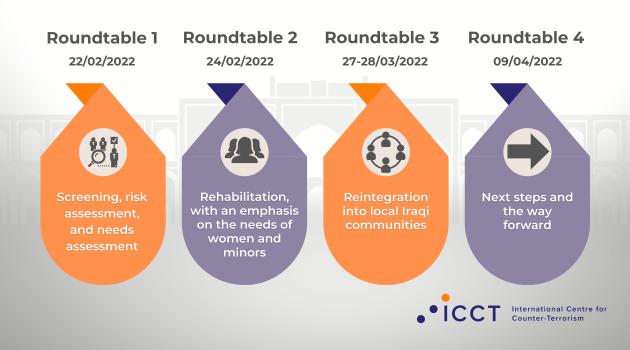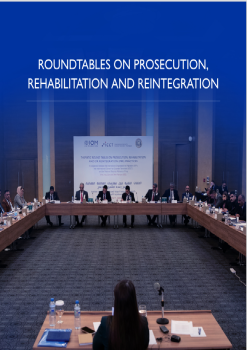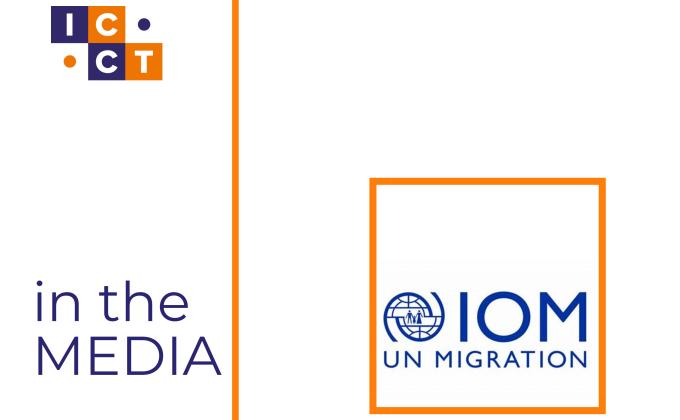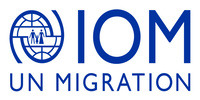In partnership with the International Organization for Migration (IOM) and the Office of the National Security Advisor (ONSA) of Iraq, ICCT has organised four roundtables on Prosecution, Rehabilitation, and Reintegration (PRR) for relevant government institutions in Iraq, as well as international organisations.
ICCT’s work on PRR in Iraq contributes to the broader efforts of the United Nations Global Framework on the return of third-country nationals from Iraq/Syria. Taking place in Erbil and Baghdad between February and April 2022, the roundtables provided a platform for ICCT experts to share their substantive expertise and guidance on aspects of screening, risk assessment, rehabilitation, and reintegration, and allowed for a facilitated dialogue with Iraqi stakeholders on how identified good practices could be applied in the specific context of the 30,000 Iraqi nationals returning from al-Hol Camp in North-East Syria.
Highlights
About the project
Since the end of the conflict with the Islamic State in Iraq and the Levant (ISIL) in 2019, around 64,000 people have remained in Al-Hol camp, located in the northeast Syria (NES). Conditions in the camp remain dire, with violence and deprivation being prevalent. At Al-Hol, 94% are women and children, with nearly half of them (approximately 30,000) Iraqi, 37% Syrian, and 15% have a foreign nationality.
In contrast to the majority of states, who are largely unwilling to repatriate their nationals from NES, Iraq has publicly committed to repatriating all Iraqis from NES and since May 2021 has been proactively taking steps to fulfil its obligations to do so. IOM and other UN agencies are working to support the Government of Iraq (GoI) in carrying out PRR in line with global good practices, and ICCT has contributed to this effort through providing expert guidance.
ICCT has been implementing projects, conducting research, and providing specialised technical assistance on the rehabilitation and reintegration of individuals affiliated with violent extremism, including violent extremist offenders (VEOs), since 2010. Since mid-2012, ICCT has worked on issues related to Foreign Fighters, including exploring a range of issues related to legal, preventative, motivational and rehabilitative aspects of the phenomenon.
Objectives
- Provide technical expertise on screening, risk assessment, rehabilitation, and reintegration of adults and children being repatriated after affiliated with violent extremist groups;
- Discuss with national stakeholders and the international community how evidence-based good practices can be applied in the specific context of Iraqi nationals returning from northeast Syria, with a view to support the ongoing repatriation process started in May 2021.
Activities
ICCT experts led a series of four roundtables, held between February and April 2022. These were designed to enhance awareness among GoI stakeholders of good practices in PRR and to provide a forum to address the many challenges facing Iraq in the repatriation of its approximately 30,000 nationals from northeast Syria. Faced with a particularly complex and unique group of citizens with differing levels of involvement with ISIL and a diverse range of experiences, the unprecedented situation confronting the Government of Iraq is one that will require a long-term, sustainable approach, including ongoing technical assistance.
Among the range of topics covered during the roundtables included:
- Screening, Risk Assessment, and Needs Assessment;
- Rehabilitation, with Particular Emphasis on the Rehabilitation Needs of Women and Minors;
- Reintegration into Local Iraqi Communities;
- Next Steps and the Way Forward.
Participants of the roundtables included representatives from Iraqi government institutions, at both the central and governorate levels, as well as representatives from the international community, including UNOCT, UNICEF, UNCTED, UNESCO, UNDP, and others.








